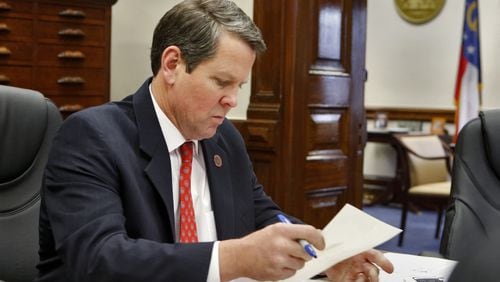Georgia Secretary of State Brian Kemp faces a pair of lawsuits that claim he and other investors in a canola and sunflower oil processor failed to repay more than $700,000 in loans.
The separate lawsuits were filed this month by two firms that loaned money to Hart AgStrong, a Danielsville-based agriculture business. They both contend that Kemp, one of four Republicans in the 2018 race for Georgia governor, was among several investors who signed documents agreeing to personally pay back the loans.
Kemp said in a statement that he is one of “many” investors in Hart AgStrong and that he continues to “offer strategic advice to leadership as they work to resolve these financial matters.”
The two separate lawsuits, filed within days of each other, make similar claims.
Mattaniah Limited Partnership, a Florida-based investment firm, said in a federal lawsuit that it loaned nearly $280,000 to Hart AgStrong in April 2014 and that Kemp and several other investors signed personal guarantees.
The borrowers failed to pay a quarterly payment in September 2015 and have been in default since December 2015, the lawsuit said. It seeks repayment of at least $220,000 that includes the principal and interest.
The second complaint was filed by RLP Investments in Stephens County Superior Court. That firm said it doled out a $500,000 loan to Hart AgStrong in January 2016 that was guaranteed by Kemp and a business partner. It seeks repayment of the $500,000 loan plus interest.
Hart AgStrong started with a small canola crushing facility in Bowersville, Ga., in 2009 and built a second plant in Kentucky in 2014. The Progressive Farmer, an agriculture outlet, reported in March that the company's license was suspended because it failed to repay farmers roughly $2.5 million from last year's crop.








